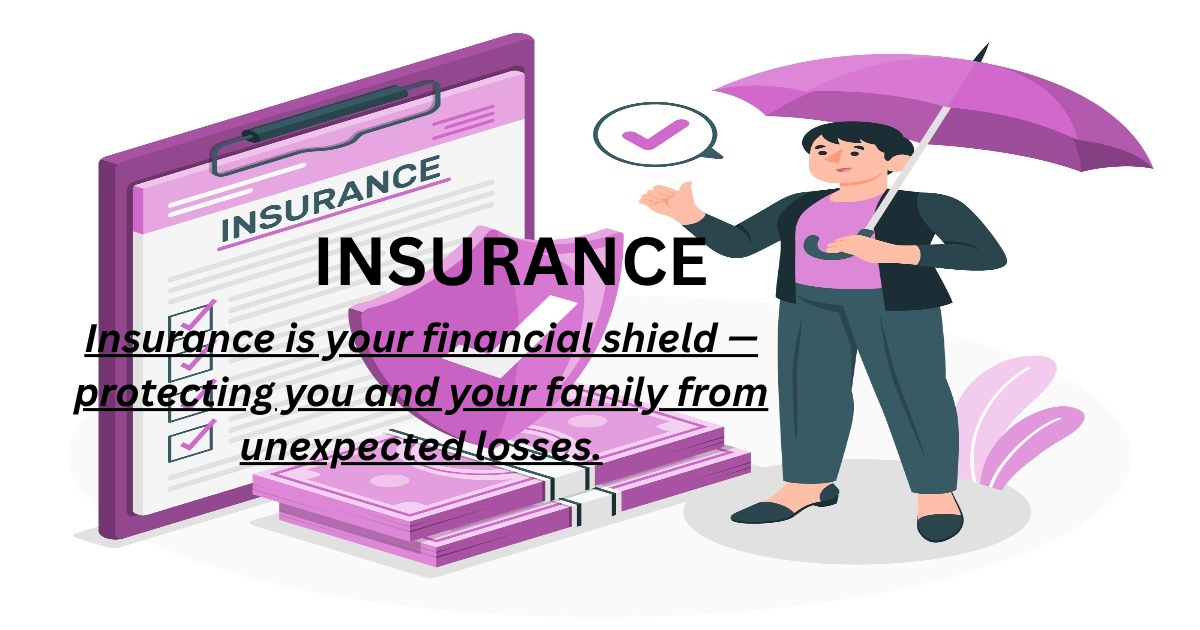Introduction
Insurance is a promise of protection. It helps individuals and businesses recover from financial losses caused by accidents, health issues, or other risks. Through regular premium payments, insurance acts as a safety net, offering support when life takes an unexpected turn.

What is Insurance?
Insurance is a financial agreement between you (the policyholder) and an insurance company. You pay a certain amount regularly (called a premium), and in return, the company promises to compensate you for specific types of loss, damage, or risk in the future.
In short:
🔁 You pay a small amount now →
💰 You get financial help later if something bad happens.
How Does Insurance Work?
-
You buy a policy
Choose a policy based on what you want to protect (life, health, car, etc.). -
Pay regular premiums
Monthly, quarterly, or yearly payments to the insurance company. -
Risk coverage begins
If something covered under your policy happens (e.g., an accident), you can make a claim. -
Claim settlement
The company reviews your claim and pays out the money (or the service) as per policy terms.
Example
You buy a health insurance policy. You pay ₹10,000 per year. After 6 months, you get hospitalized and your bill is ₹1.5 lakh.
You file a claim → Insurance company pays the bill (as per terms) → Your savings are safe
Key Terms to Understand
-
Premium: The amount you pay for insurance.
-
Claim: Requesting compensation after a covered loss.
-
Sum Assured: The maximum amount the insurer will pay.
-
Policy: Legal contract that mentions coverage, terms, and conditions.
Why is Insurance Important?
Life is full of surprises. Sometimes good, sometimes not so good — like accidents, illness, or theft. These problems can cost a lot of money. That’s why insurance is important. It helps you in hard times by giving you financial support.
1. It Saves Your Money
Imagine you go to the hospital and the bill is ₹2 lakh. If you have health insurance, the company will pay the bill. You don’t have to worry.
So, insurance helps you save your money in emergencies.
2. Peace of Mind
When you have insurance, you feel safe.
You know: “If something goes wrong, I’m protected.”
That’s called peace of mind — very important in today’s stressful life.
3. Helps You Plan Better
Insurance is a smart part of financial planning.
-
Life insurance = protects your family
-
Health insurance = protects your health
-
Car insurance = protects your vehicle
Insurance means you are ready for future problems.
4. Protects Your Family
If something happens to you, who will take care of your family?
Life insurance gives money to your family if you die. It helps them live a good life even when you’re not around.
5. Sometimes It’s Required by Law
In India, some insurance is mandatory:
-
Every vehicle must have insurance (as per law).
-
Some travel or job visas also require insurance.
So, it’s not just useful — sometimes it’s compulsory.
6. Good for Business Owners
If you own a business, insurance protects you from losses like:
-
Fire
-
Theft
-
Customer complaints
-
Worker injuries
It helps your business run smoothly.
What is Risk in Insurance
Insurance is all about managing risk. But what exactly does “risk” mean in insurance?
In simple words, risk is the chance that something bad might happen — like an accident, illness, theft, or loss. Insurance helps you deal with those risks by giving you financial protection.
Let’s understand this more clearly.
Types of Risk in Insurance
There are different kinds of risks:
1. Personal Risk
Risk of death, injury, or illness (covered by life and health insurance)
2. Property Risk
Risk of damage to your car, house, or belongings (covered by motor or home insurance)
3. Liability Risk
If someone sues you or blames you for damage, you may have to pay (covered by liability insurance)
4. Business Risk
Losses due to fire, theft, employee injury, etc. (covered by business insurance)
Example of Risk
Let’s say you own a car. Every day you drive, there is a risk of accident.
You may never face it — or it might happen tomorrow. If it does, car repairs could cost ₹50,000.
But if you have car insurance, the risk is transferred to the insurance company. You don’t pay the big cost — they do.
Why Understanding Risk is Important
When you understand what risks you face, you can choose the right insurance.
-
If you have a family: Life insurance is important
-
If you have health issues: Health insurance is needed
-
If you drive: Motor insurance is must-have
What is a Insurance Policy?
An insurance policy is a legal agreement between you (the policyholder) and the insurance company. It clearly explains what the company will cover and what it won’t if something goes wrong.It is your proof of protection.
What’s Inside an Insurance Policy?
Here are the main things every policy includes:
1. Policyholder Details
Your name, contact, age, and other personal details.
2. Coverage
What is being insured — your life, health, car, home, etc.
3. Sum Assured
The maximum amount the company will pay in case of a claim.
4. Premium
How much money you have to pay — monthly, quarterly, or yearly.
5. Policy Term
The time for which the policy is valid (1 year, 10 years, lifetime, etc.)
6. Inclusions
Events and situations the insurance will cover.
7. Exclusions
Events the company will not cover (like self-harm or pre-existing illness in some health plans).
8. Claim Procedure
Step-by-step guide on how to get money from the company if something happens.
Example
Let’s say you buy health insurance:
-
₹5 lakh sum assured
-
₹10,000 yearly premium
-
Covers hospital bills for illness or accidents
-
Does not cover dental check-ups or cosmetic surgery
If you get dengue and are hospitalized, the insurance company will pay your medical bill based on this policy.
Always ask for
-
A PDF copy of your insurance policy
-
A policy summary or “key facts” document — this gives you a short and clear overview
Keep a soft and printed copy in a safe place. Share a copy with a family member too.
Types of Insurance
1. Life Insurance
Life insurance gives financial support to your family if you pass away. It helps them cover daily expenses, loans, and future goals.
There are many different types of insurance. Each one protects a different part of your life — like your health, your car, your income, or your family’s future.
Let’s explore the main types of insurance you should know about:
Types
-
Term Insurance: Low premium, covers only death
-
Whole Life Insurance: Covers for your entire life
-
Endowment/ULIP: Life cover + savings or investment
Best for: People with dependents (spouse, kids, parents)
2. Health Insurance
Health insurance covers your medical expenses. It helps pay for hospital bills, surgeries, treatments, and sometimes even medicines.
Types:
-
Individual Health Plan
-
Family Floater Plan
-
Senior Citizen Plan
-
Critical Illness Plan
Best for: Everyone — medical costs are rising fast
3. Insurance (Car/Bike)
Motor insurance protects your vehicle from accidents, theft, or natural disasters. It also covers damage caused to others.
Types
-
Third-Party Insurance: Required by law in India
-
Comprehensive Insurance: Covers both your vehicle and others
Best for: Every vehicle owner
4. Home Insurance
Home insurance covers your house and belongings from fire, theft, flood, earthquake, and more.
It can also cover valuable items like electronics, jewellery, and furniture.
Best for: Homeowners and property investors
5. Travel Insurance
Travel insurance protects you while you’re traveling. It covers:
-
Trip cancellations
-
Lost luggage
-
Medical emergencies abroad
-
Flight delays
Best for: Domestic and international travelers
6. Personal Accident Insurance
This covers death or disability due to accidents.
It offers:
-
Lump sum payment for accidental death
-
Compensation for permanent disability
-
Hospital costs due to accident
Best for: Frequent travelers, bike riders, or those in risky jobs
7. Business Insurance
Business insurance protects a company from losses due to:
-
Fire or theft
-
Machinery breakdown
-
Employee injury
-
Legal claims from customers
Best for: Shop owners, startups, large businesses
8. Gadget or Mobile Insurance
This covers smartphones, laptops, and electronics from:
-
Accidental damage
-
Water damage
-
Theft or loss
Best for: Users of expensive devices
Different types of insurance serve different needs. Whether it’s your life, health, home, or travel — having the right kind of insurance keeps you financially safe.
Before choosing, ask:
-
What do I need to protect?
-
Can I afford to lose it?
-
If not, do I have insurance for it?
Benefits of Insurance
Insurance is not just a monthly or yearly payment. It’s a smart financial tool that protects your life, health, property, and future. Let’s look at the biggest advantages of having insurance.
-
Financial Protection
Insurance covers big unexpected expenses like hospital bills, accidents, or property loss. -
Peace of Mind
You feel relaxed knowing you’re protected in case something bad happens. -
Stress-Free Emergency Handling
Insurance helps you manage emergencies without worrying about money. -
Supports Financial Planning
Some insurance plans (like life or pension policies) help you save and grow money over time. -
Tax Benefits
Save tax on premiums paid for life and health insurance under Sections 80C and 80D. -
Legal Requirement
Motor insurance is mandatory by law in India. Some jobs or businesses also need specific insurance. -
Protects Your Family’s Future
Life insurance ensures your family can manage expenses even if you’re not there. -
Easy and Fast Online Services
Many companies offer online buying, claim tracking, and paperless support.
Top Insurance Companies in India
| Company Name | Type | Best For |
|---|---|---|
| LIC | Life | Trust & Coverage |
| HDFC Life | Life | Online & Term Plans |
| ICICI Prudential | Life | ULIPs & Retirement |
| SBI Life | Life | Banking Customers |
| Max Life | Life | High Claim Ratio |
| Star Health | Health | Pure Health Coverage |
| Niva Bupa | Health | Direct Claim Settlement |
| ICICI Lombard | General | Motor & Travel |
| New India Assurance | General | Govt-backed Low Premiums |
| Tata AIG | General | Quick Claims & Digital Services |
How to Choose the Right Insurance?
Choosing the right insurance is important for your safety and peace of mind. Here’s how to do it:
| Step | What to Do |
|---|---|
| 1. Identify Your Needs | Life, Health, Motor, Travel, etc. – what do you really need to protect? |
| 2. Set Your Budget | Choose a premium you can pay comfortably (monthly/yearly) |
| 3. Compare Plans | Use online comparison tools to check features and prices |
| 4. Check Coverage | Read what the policy includes and excludes (inclusions/exclusions) |
| 5. Look at Claim Ratio | Higher claim settlement ratio = better trust |
| 6. Read Customer Reviews | Check real user experiences on claim process and service |
| 7. Choose a Trusted Brand | Go with IRDAI-approved, well-known insurers with good customer support |
FAQs
What is insurance in simple words?
Insurance is a contract where you pay a small amount (premium) to get big financial help during emergencies like illness, accidents, or death.
Is insurance mandatory in India?
Some insurance types are mandatory, like third-party motor insurance. Others, like health and life insurance, are optional but highly recommended.
Which type of insurance is best?
It depends on your needs
Life insurance if you have dependents
Health insurance for medical emergencies
Motor insurance if you own a vehicle
What is the claim settlement ratio?
It shows how many claims an insurance company has approved out of total received.
Higher ratio better trust and service.
What documents are needed to buy insurance?
Listed below are the documents mandatory of submit to avail the benefits of insurance: ID proof (Aadhar/PAN), Address proof, passport-size photo, driving licence.
Can I cancel my insurance?
Yes, most policies offer a 15-day free-look period. After that, cancellation is possible but may involve charges.
Is online insurance safe?
Yes, buying insurance online is safe if done through: Official company websites, IRDAI-approved platforms and Trusted aggregators (like PolicyBazaar)
How to file an insurance claim?
Steps to getting your file an insurance claim
1. Inform the company immediately
2. Submit documents (bills, proof, ID, policy copy)
3. Company verifies and approves
4. Money is credited to your account
What happens if I miss a premium payment?
You may get a grace period (15–30 days). If you miss that too, your policy can lapse, and you lose the benefits.
What is not covered in insurance?
These are called exclusions. Common exclusions include:
1. Pre-existing diseases (in some health plans)
2. Self-inflicted injuries
3. War or terrorism-related events
4. Drunk driving accidents
Conclusion
In today’s world, insurance is not just an option — it’s a necessity.
Whether it’s health, life, motor, or home, insurance protects you from unexpected financial shocks. It helps your family stay secure, supports your goals, and gives you peace of mind.
By choosing the right policy and trusted company, you can:
- Avoid huge hospital or repair bills
- Protect your loved ones
- Save tax
- Build long-term wealth (in some plans)
India has many great insurers offering flexible and digital-first services — now it’s easier than ever to get covered.
Don’t wait for a crisis. Be prepared, be insured.







